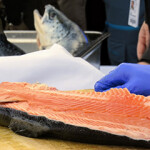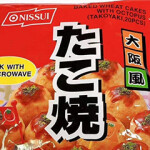New partnerships increase use of satellite data to curb IUU fishing
Two announcements this week by technology firms working with the seafood industry will increase the industry’s use of and reliance on satellite data to combat illegal, unreported and unregulated (IUU) fishing.
Global Fishing Watch (GFW), a partnership between Oceana, SkyTruth and Google providing near real-time satellite tracking, has teamed up with Trace Register, a technology firm that provides traceability solutions to the seafood industry, to offer access to GFW’s data to all Trace Register customers.
"We are excited to announce that we’re extending our food traceability solution and will now link Global Fishing Watch data directly to the seafood that was produced. Harvesters will be able to use GFW data to provide assurances they operate in a legal and responsible manner,” Trace Register CEO Phil Werdal said. "Seafood processors, distributors, retailers, foodservice providers, and ultimately the consumer, can verify their seafood was legally and responsibly produced."
Jacqueline Savitz, vice president for Global Fishing Watch at Oceana, said the new partnership will also assist consumers to make more informed purchasing decisions.
“Together, Trace Register and Global Fishing Watch will increase transparency in the seafood supply chain, connecting the dots from the point of catch to the point of sale,” she said.
Carrie Brownstein, global seafood quality standards coordinator at Whole Foods Market, called the increasing use of satellite technology in the seafood industry a “revolution.”
“As a retailer committed to transparency, sustainability and the highest quality standards, traceability is critical to accomplishing that mission,” Brownstein said. “This tool demonstrates that we’re on the brink of a technological revolution that will bring fishing activity out of the dark and create heightened visibility, benefitting the industry, the consumer and our oceans.”
In related news, a new pilot program has been launched designed to prove the efficacy of using satellite technology to provide consumers with boat-to-port traceability of wild-caught seafood.
Announced at the Our Ocean conference in Washington, D.C., on Thursday, 15 September, the pilot program, resulting from a partnership of PT Bali Seafood International (BSI), Pelagic Data Systems (PDS) and GFW, will install passive tracking devices on around 100 small artisanal fishing vessels in Indonesia.
In the announcement of the partnership, BSI President Jerry Knecht called the use of satellite technology for vessel location in the global fishing fleet a “game-changer.”
“Global Fishing Watch makes it possible to understand catch locations and control harvest, cornerstones of sustainable fishing,” he said. “Now that we are scaling the electronic tracking of the small boat fleet, we can begin to fill in the coastal vessel location and harvest picture, allowing for effective management at all levels of harvest.”
BSI and PDS completed a successful 20-boat pilot tracking ahi tuna caught off Sumbawa in the Indonesian archipelago in 2015. However, the new program addresses a data gap, as artisanal boats are not typically outfitted with the same tracking technology as the large-scale fishing boats.
By outfitting small vessels with the means to track product from boat-to-port, this program will help increase the value of the seafood harvested by participating small boat fishers, will provide robust data about fishing activity to inform sustainable management practices, and will demonstrate “a novel, cost-effective transparency approach that can be scaled globally,” said PT Bali Seafood in a statement.
“This collaboration takes us one step closer to ridding the world of illegal fishing,” said PDS CEO Dave Solomon. “We are fortunate to be at a place where we have the technology, the partnerships and the momentum to make fishing activity as transparent as possible.”






Share